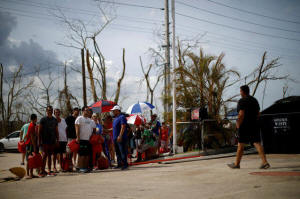|
Puerto Rico seeks waiver of shipping
restrictions to speed hurricane relief
 Send a link to a friend
Send a link to a friend
 [September 28, 2017]
By Robin Respaut [September 28, 2017]
By Robin Respaut
SAN JUAN, Puerto Rico (Reuters) - Puerto
Rico officials pressed the Trump administration on Wednesday to lift a
ban on foreign shipping between American ports while the U.S. island
territory struggled with fuel, water and medical shortages one week
after Hurricane Maria struck.
Even as federal emergency management authorities and the U.S. military
stepped up relief efforts, many residents on the island of 3.4 million
people voiced exasperation at the prolonged lack of electricity,
reliable drinking supplies and other essentials.
Maria, the most powerful hurricane to hit Puerto Rico in nearly 90
years, swept across the island with roof-ripping winds last Wednesday,
knocking out the territory's entire power grid, unleashing severe
flooding and causing widespread heavy damage to homes and
infrastructure.
The storm claimed more than 30 lives across the Caribbean, including at
least 16 in Puerto Rico. Governor Ricardo Rossello called the
devastation an unprecedented natural disaster.

Medical experts said they were concerned about a looming public health
crisis posed by the island's crippled water and sewage treatment system.
The delivery of relief supplies has been complicated by communication
outages and roads still damaged by flooding or left impassable by fallen
trees, wires and debris.
Desperate residents have waited hours in long lines for deliveries of
diesel fuel to power generators and gasoline to refill empty automobile
tanks. Some water-supply trucks have been mobbed.
Rossello has strongly praised the response of U.S. President Donald
Trump, defending the Republican administration against complaints of
being slow to act and showing too little concern.
On Wednesday the governor and others pushed Trump to temporarily waive
the Jones Act, a law requiring that all goods shipped between U.S. ports
be carried by U.S. owned-and-operated vessels.
Administration officials on Tuesday balked at the idea, saying there was
sufficient shipping capacity for emergency deliveries to Puerto Rico in
the U.S. merchant fleet, but Trump said on Wednesday that a waiver was
under consideration.
"We're thinking about that," Trump told reporters. "But we have a lot of
shippers and .... a lot of people that work in the shipping industry
that don't want the Jones Act lifted, and we have a lot of ships out
there right now."
Puerto Rico typically gets most of its fuel by ship from the United
States, but one of its two main ports is closed and the other is
operating only during the daytime.
"We expect them to waive it (the Jones Act)," Rossello told CNN on
Wednesday, noting there was a brief waiver issued after Hurricane Irma,
which was much less devastating as it grazed past the island en route to
Florida earlier this month.

Members of Congress from both parties have supported an emergency
waiver, he said.
The U.S. government has issued periodic Jones Act waivers following
severe storms in the past, including Irma and Hurricane Harvey, which
ravaged the coastal Texas and Louisiana in August.
LACK OF WATER, FUEL
Growing frustration levels were evident among throngs of island
residents struggling on a daily basis to cope without basic necessities.
Despite gasoline rationing, service stations have been able to stay open
just a few hours at a time, and more than 91 percent of cellular
communication sites remained out of service, U.S. officials said.
[to top of second column] |

People queue to fill container with gasoline in a gas station after
the area was hit by Hurricane Maria in Toa Baja, Puerto Rico
September 24, 2017. REUTERS/Carlos Garcia Rawlins/File Photo

Electrical outages also have left many without internet or cable
services, while at least nine radio stations and one television
broadcaster were still off the air on Wednesday.
Most hospitals were without electricity or adequate fuel for
generators, though the island was expected to get some medical
relief next week with the arrival of the 1,000-bed U.S. Navy
hospital ship Comfort, due to sail from its home port in Virginia on
Friday. {nL2N1M900P]
Long-term power restoration will require a rebuilding of generation,
transmission and distribution facilities, according to the Federal
Emergency Management Agency (FEMA), which oversees the disaster
response.
On Tuesday, hundreds of people crowded around a government water
tanker in the northeastern municipality of Canovanas, some 15 miles
(25 km) east of the capital San Juan, with containers of every size
and shape after a wait that for many had lasted days.
"I know there can be more help," said Juan Cruz as he filled a
container. Residents there said it was the first such truck to visit
their neighborhood since the hurricane struck.
"We can use more help,” Cruz said. “We are U.S. citizens. We are
supposed to be treated equally."

U.S. Air Force Colonel Michael Valle, on hand for relief efforts in
San Juan, said he was most concerned about "the level of
desperation" that could arise if fuel distribution did not return to
normal within a couple of weeks.
San Juan resident Joselyn Velasquez said she thought aid was too
slow to arrive.
"They say that it is coming from the United States, but who are they
giving it to because I haven't received any at my house?" Velasquez
asked. "No one has knocked on my door and said, 'Here is some
rice.'"
The FEMA said that by Wednesday that it had delivered more than 4.4
million meals and 6.5 million liters of water in Puerto Rico and the
U.S. Virgin Islands since Maria ravaged the Caribbean.
In Washington, Republican leaders who control both chambers of
Congress have said they are prepared to boost disaster funding, but
are waiting for a detailed request from the Trump administration.
In the meantime, the administration still has $5 billion in aid in a
disaster relief fund, and Congress has also approved about $7
billion more that will become available on Oct. 1.
(Reporting by Robin Respaut in San Juan, Puerto Rico and Scott
DiSavino in New York; Additional reporting by Reuters TV in Puerto
Rico and Doina Chiacu, Roberta Rampton, Richard Cowan, Timothy
Gardner and Jeff Mason in Washington; Writing by Bill Rigby and
Steve Gorman; Editing by Frances Kerry, Lisa Shumaker and Michael
Perry)
[© 2017 Thomson Reuters. All rights
reserved.]
Copyright 2017 Reuters. All rights reserved. This material may not be published,
broadcast, rewritten or redistributed.
 |